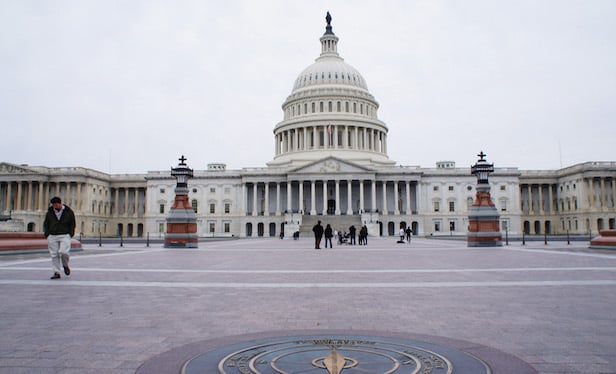WASHINGTON, DC–Congress is set to reconvene on Monday amid intense pressure to meet April 29th's deadline. That is the day that the government's current spending authority runs out and coincidentally it also happens to be the 100th day that President Trump will have been in office.
Thus, the thinking went, some kind of deal — be it an actual Omnibus Spending bill, or a continuing resolution — would surely be passed.
Until the last few days, that is, when President Trump dropped two bombshells on the Washington establishment. One is that he plans to introduce his plan for comprehensive tax reform on Wednesday of this week, much earlier than many had been expecting.
The other are the signals the Administration has sent this weekend that it will be playing hardball about funding for the proposed wall between the US and Mexico.
Trump used his favorite platform, Twitter, to attack Democrats for their opposition to the wall. He also promised that Mexico would pay for it at a later date.
Meanwhile, OMB Director Mick Mulvaney has suggested that if Democrats want the White House's cooperation on maintaining insurance subsidies for low-income consumers they will agree to financing the wall.
How much of these demands are posturing for negotiations and how much are hard lines is unknown. We will find out soon enough.
For CRE, Little Peril From A Shutdown
A government shutdown on its own is not the end of the world, at least not for the commercial real estate community, Joseph Brennan, managing director of JLL's national Government Investor Services practice, headquartered in Washington, DC, tells GlobeSt.com.
“The essential pieces of government still functions in a shutdown and that is all the real estate community needs — that their rents get paid and so on,” he says.
A shutdown could have an impact on the leasing deals that are in play but those are moving at a snail's pace anyway, Brennan adds.
A larger concern is confidence in the government, he continues. “Landlords start to ask themselves, 'should I focus on the government in the long run?' Fund managers ask themselves, 'should I convince investors that investing in federal real estate is a safe bet'”?
Ultimately, Brennan says, “I think we will have a CR or two or three. I don't think there will be a budget this year. A budget is hard and these CRs seem to be easy.”
The Impact On Washington, DC
John Boland, a vice chairman at Newmark Grubb Knight Frank's Washington, DC, office, also doesn't believe there will a shutdown of the government.
“Republicans don't want to be blamed for the government closing down on their watch,” he tells GlobeSt.com. “And President Trump doesn't want to look like he doesn't know what he is doing.”
Instead, the story that Boland is closely watching is how will the Washington DC market be affected when a budget is finally put into place. More than likely there won't be the draconian cuts that the president proposed in his budget earlier this year — but there are clearly going to be cuts of some kind.
Right now investors are waiting to see what those cuts will be, slowing the pace of deals to a crawl, Boland notes.
Non-profits especially are on tenterhooks — and so are the landlords that rent to them.
“Planned Parenthood is looking to do a deal in town but if you were a landlord would you sign a lease with them?” he says.
That is a rhetorical question although the answer to it is 'probably yes.' Planned Parenthood has a good deal of support lined up to at least partially replace any loss in federal funding.
“Planned Parenthood is probably not going anywhere but other non-profits, funded by the Department of Housing and Urban Development and the US Agency for International Development, they could be in trouble,” Boland says.
Tax Reform Cometh
Complicating matters is the roll out of President Trump's tax reform proposal. At worst, it could further poison relations between the two parties in Congress, at best it will be a distraction during this pivotal week. On top of which, it doesn't seem likely that the many details about tax reform that various industries have been aching to know will make an appearance on Wednesday, per comments by Mulvaney.
What will be revealed this week, Mulvaney told reporters, will be “specific governing principles” for the tax plan and some indications of what the new rates might be. The complete proposal will make its debut in June, he said.
For the real estate community, these statements suggest they won't have the answers to some key questions this week. Trump has floated various proposals over the course of the year, some of which have alarmed the industry.
For example, there is the question of eliminating the tax deduction for interest payments by business — something that House Republicans also want. Their argument is that this deduction distorts the capital markets as dividend payments are not deductible and thus debt become favored by developers over stock. There is also the question of whether depreciation will be eliminated in favor of immediate deductibility, or expensing, of capital expenditures. The latter, however, is not tenable if the former remains in place.
By the way, President Trump has also signaled that a new health insurance reform measure was close to completion in the House of Representatives but that is too much to think about — at least for this week.
WASHINGTON, DC–Congress is set to reconvene on Monday amid intense pressure to meet April 29th's deadline. That is the day that the government's current spending authority runs out and coincidentally it also happens to be the 100th day that President Trump will have been in office.
Thus, the thinking went, some kind of deal — be it an actual Omnibus Spending bill, or a continuing resolution — would surely be passed.
Until the last few days, that is, when President Trump dropped two bombshells on the Washington establishment. One is that he plans to introduce his plan for comprehensive tax reform on Wednesday of this week, much earlier than many had been expecting.
The other are the signals the Administration has sent this weekend that it will be playing hardball about funding for the proposed wall between the US and Mexico.
Trump used his favorite platform, Twitter, to attack Democrats for their opposition to the wall. He also promised that Mexico would pay for it at a later date.
Meanwhile, OMB Director Mick Mulvaney has suggested that if Democrats want the White House's cooperation on maintaining insurance subsidies for low-income consumers they will agree to financing the wall.
How much of these demands are posturing for negotiations and how much are hard lines is unknown. We will find out soon enough.
For CRE, Little Peril From A Shutdown
A government shutdown on its own is not the end of the world, at least not for the commercial real estate community, Joseph Brennan, managing director of JLL's national Government Investor Services practice, headquartered in Washington, DC, tells GlobeSt.com.
“The essential pieces of government still functions in a shutdown and that is all the real estate community needs — that their rents get paid and so on,” he says.
A shutdown could have an impact on the leasing deals that are in play but those are moving at a snail's pace anyway, Brennan adds.
A larger concern is confidence in the government, he continues. “Landlords start to ask themselves, 'should I focus on the government in the long run?' Fund managers ask themselves, 'should I convince investors that investing in federal real estate is a safe bet'”?
Ultimately, Brennan says, “I think we will have a CR or two or three. I don't think there will be a budget this year. A budget is hard and these CRs seem to be easy.”
The Impact On Washington, DC
John Boland, a vice chairman at Newmark Grubb Knight Frank's Washington, DC, office, also doesn't believe there will a shutdown of the government.
“Republicans don't want to be blamed for the government closing down on their watch,” he tells GlobeSt.com. “And President Trump doesn't want to look like he doesn't know what he is doing.”
Instead, the story that Boland is closely watching is how will the Washington DC market be affected when a budget is finally put into place. More than likely there won't be the draconian cuts that the president proposed in his budget earlier this year — but there are clearly going to be cuts of some kind.
Right now investors are waiting to see what those cuts will be, slowing the pace of deals to a crawl, Boland notes.
Non-profits especially are on tenterhooks — and so are the landlords that rent to them.
“Planned Parenthood is looking to do a deal in town but if you were a landlord would you sign a lease with them?” he says.
That is a rhetorical question although the answer to it is 'probably yes.' Planned Parenthood has a good deal of support lined up to at least partially replace any loss in federal funding.
“Planned Parenthood is probably not going anywhere but other non-profits, funded by the Department of Housing and Urban Development and the US Agency for International Development, they could be in trouble,” Boland says.
Tax Reform Cometh
Complicating matters is the roll out of President Trump's tax reform proposal. At worst, it could further poison relations between the two parties in Congress, at best it will be a distraction during this pivotal week. On top of which, it doesn't seem likely that the many details about tax reform that various industries have been aching to know will make an appearance on Wednesday, per comments by Mulvaney.
What will be revealed this week, Mulvaney told reporters, will be “specific governing principles” for the tax plan and some indications of what the new rates might be. The complete proposal will make its debut in June, he said.
For the real estate community, these statements suggest they won't have the answers to some key questions this week. Trump has floated various proposals over the course of the year, some of which have alarmed the industry.
For example, there is the question of eliminating the tax deduction for interest payments by business — something that House Republicans also want. Their argument is that this deduction distorts the capital markets as dividend payments are not deductible and thus debt become favored by developers over stock. There is also the question of whether depreciation will be eliminated in favor of immediate deductibility, or expensing, of capital expenditures. The latter, however, is not tenable if the former remains in place.
By the way, President Trump has also signaled that a new health insurance reform measure was close to completion in the House of Representatives but that is too much to think about — at least for this week.
Want to continue reading?
Become a Free ALM Digital Reader.
Once you are an ALM Digital Member, you’ll receive:
- Breaking commercial real estate news and analysis, on-site and via our newsletters and custom alerts
- Educational webcasts, white papers, and ebooks from industry thought leaders
- Critical coverage of the property casualty insurance and financial advisory markets on our other ALM sites, PropertyCasualty360 and ThinkAdvisor
Already have an account? Sign In Now
*May exclude premium content© 2024 ALM Global, LLC, All Rights Reserved. Request academic re-use from www.copyright.com. All other uses, submit a request to [email protected]. For more information visit Asset & Logo Licensing.









